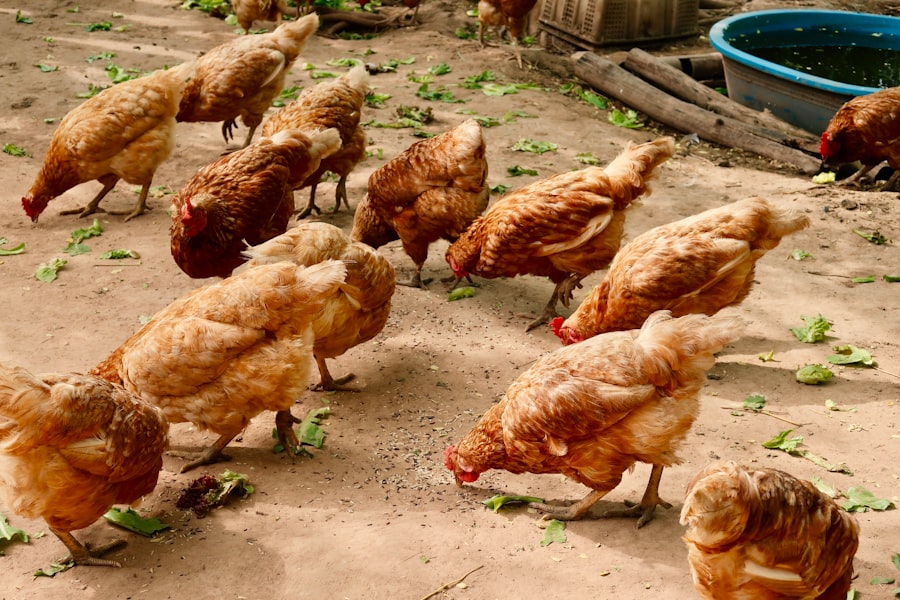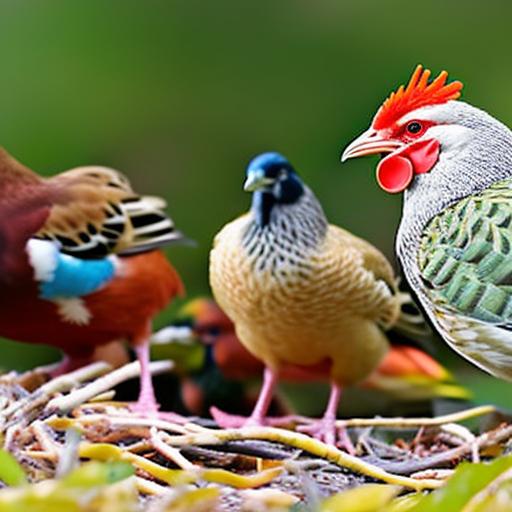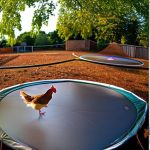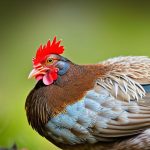Aviaries and chicken coops are structures designed to provide a safe and comfortable environment for birds, specifically chickens. An aviary is a large enclosure that allows birds to fly and move around freely, while a chicken coop is a smaller enclosure that provides shelter and protection for chickens. Both aviaries and chicken coops offer numerous benefits for bird owners.
One of the main benefits of having an aviary or chicken coop is that it provides a safe space for birds to live. These enclosures protect birds from predators such as foxes, raccoons, and birds of prey. Additionally, aviaries and chicken coops prevent birds from wandering off and getting lost or injured. By providing a secure environment, aviaries and chicken coops give bird owners peace of mind knowing that their feathered friends are safe.
Another advantage of having an aviary or chicken coop is that it allows birds to engage in natural behaviors. In an aviary, birds have the freedom to fly, perch, and socialize with other birds. This promotes physical and mental stimulation, which is essential for their overall well-being. Similarly, a chicken coop provides chickens with a space to scratch the ground, dust bathe, and roost. These natural behaviors help keep chickens healthy and happy.
Key Takeaways
- Aviaries and chicken coops provide a safe and comfortable environment for chickens to live in.
- Choosing the right location for your aviary is crucial for the health and safety of your chickens.
- Designing your chicken coop with proper ventilation and lighting is important for their well-being.
- Selecting the right breed of chicken for your aviary can impact their productivity and temperament.
- Feeding and watering your chickens regularly and maintaining a clean environment is essential for their health.
Choosing the Right Location for Your Aviary
Choosing the right location for your aviary is crucial for the well-being of your birds. The location should provide adequate sunlight, protection from harsh weather conditions, and be easily accessible for maintenance purposes.
Firstly, it’s important to consider the amount of sunlight your aviary will receive. Birds need exposure to natural sunlight for their overall health and well-being. Choose a location that receives at least 4-6 hours of direct sunlight each day. This will ensure that your birds receive enough vitamin D, which is essential for their bone health and immune system.
Secondly, consider the protection your aviary will provide against harsh weather conditions. Avoid placing your aviary in areas that are prone to strong winds or heavy rainfall. These conditions can cause stress and discomfort for your birds. Instead, choose a location that offers some natural protection, such as near a tree line or a building.
Lastly, accessibility is an important factor to consider when choosing the location of your aviary. You will need to regularly clean and maintain the enclosure, so it should be easily accessible for you. Additionally, consider the noise level and proximity to neighbors. Aviaries can be noisy, especially during breeding season, so it’s important to be mindful of the impact on those around you.
Designing Your Chicken Coop for Maximum Comfort
Designing a comfortable chicken coop is essential for the health and well-being of your chickens. A well-designed coop provides adequate space, ventilation, and nesting areas for your chickens.
Firstly, ensure that your chicken coop has enough space for your chickens to move around comfortably. The general rule of thumb is to provide at least 4 square feet of space per chicken. This allows them to stretch their wings and engage in natural behaviors such as scratching and dust bathing.
Ventilation is another important aspect of a comfortable chicken coop. Good ventilation helps remove moisture, ammonia, and odors from the coop, which can lead to respiratory issues for your chickens. Ensure that your coop has windows or vents that can be opened and closed as needed to regulate airflow.
Nesting areas are also crucial for the comfort of your chickens. Provide enough nesting boxes for your hens to lay their eggs comfortably. Each nesting box should be about 12×12 inches and filled with clean bedding material such as straw or wood shavings.
Selecting the Right Breed of Chicken for Your Aviary
Choosing the right breed of chicken for your aviary is important as different breeds have different characteristics and requirements. Consider factors such as temperament, egg production, and climate adaptability when selecting a breed.
Temperament is an important consideration, especially if you have children or other pets. Some breeds are more docile and friendly, while others can be more aggressive or flighty. Research different breeds and choose one that suits your family’s needs and preferences.
If you are interested in egg production, consider breeds that are known for their high egg-laying capabilities. Breeds such as Leghorns and Rhode Island Reds are known for their excellent egg production. On the other hand, if you are more interested in meat production, consider breeds such as Cornish Cross or Plymouth Rocks.
Climate adaptability is also an important factor to consider when selecting a breed. Some breeds are better suited for cold climates, while others thrive in warmer climates. Choose a breed that can withstand the climate conditions in your area to ensure the health and well-being of your chickens.
Feeding and Watering Your Chickens
Proper feeding and watering are essential for the health and productivity of your chickens. A balanced diet and access to clean water will ensure that your chickens receive the necessary nutrients to thrive.
Chickens require a diet that consists of a combination of grains, protein, vitamins, and minerals. Commercial chicken feeds are available in different formulations depending on the age and purpose of your chickens. Choose a feed that is appropriate for your chickens’ needs and follow the recommended feeding guidelines.
In addition to commercial feed, chickens also benefit from access to fresh fruits, vegetables, and kitchen scraps. These provide additional nutrients and help keep chickens entertained. However, it’s important to avoid feeding them toxic foods such as chocolate, onions, or avocado.
Clean water is essential for chickens’ overall health and digestion. Ensure that your chickens have access to fresh water at all times. Provide waterers that are easy to clean and refill. During hot weather, consider adding ice cubes to the water to keep it cool.
Maintaining a Clean and Healthy Aviary

Maintaining a clean and healthy aviary is crucial for the well-being of your birds. A clean environment helps prevent the spread of diseases and parasites, and promotes overall health.
Regularly clean the aviary by removing any droppings, feathers, or debris. This can be done using a rake or shovel. Dispose of the waste properly to prevent contamination. Additionally, clean and disinfect the perches, nesting boxes, and feeding/watering areas regularly to prevent the buildup of bacteria.
Provide dust baths for your birds. Dust bathing is a natural behavior for chickens that helps keep their feathers clean and free from parasites. Create a designated area in the aviary where you can provide a dust bath mixture of sand, wood ash, and diatomaceous earth.
Monitor your birds for any signs of illness or distress. Look out for symptoms such as lethargy, loss of appetite, abnormal droppings, or changes in behavior. If you notice any signs of illness, consult a veterinarian who specializes in avian health.
Protecting Your Chickens from Predators
Protecting your chickens from predators is essential to ensure their safety. Predators such as foxes, raccoons, and birds of prey can pose a threat to your birds if not properly secured.
Firstly, ensure that your aviary or chicken coop is securely fenced to prevent predators from gaining access. Use sturdy materials such as wire mesh or hardware cloth that are buried at least 12 inches into the ground to prevent digging.
Install predator-proof locks on all doors and windows of the aviary or chicken coop. This will prevent predators from forcing their way in. Additionally, consider installing motion-activated lights or alarms to deter predators from approaching the enclosure.
During nighttime, it’s important to secure your birds in a predator-proof coop. This will provide an extra layer of protection while they sleep. Ensure that the coop is securely locked and that there are no gaps or holes where predators can enter.
Providing Adequate Ventilation and Lighting
Adequate ventilation and lighting are important for the health and well-being of your chickens. Proper airflow and lighting help prevent respiratory issues and promote natural behaviors.
Good ventilation helps remove moisture, ammonia, and odors from the chicken coop. This is important as high levels of ammonia can lead to respiratory issues for your chickens. Ensure that your coop has windows or vents that can be opened and closed as needed to regulate airflow.
Natural lighting is essential for chickens’ overall health and well-being. Exposure to natural sunlight helps regulate their internal clock and promotes vitamin D synthesis. If your coop does not have access to natural sunlight, consider installing artificial lighting that mimics natural daylight. Provide at least 14-16 hours of light per day to ensure proper egg production.
Ensuring Your Chickens Stay Warm in the Winter
Ensuring that your chickens stay warm during the winter months is crucial for their survival. Cold temperatures can be stressful for chickens and can lead to health issues if not properly managed.
Insulate the chicken coop to provide additional warmth during winter. Use materials such as straw or wood shavings to create a thick layer on the floor of the coop. This will help trap heat and provide insulation.
Consider using a heat source such as a heat lamp or a heated pad in the coop. Place the heat source in a safe location away from flammable materials and ensure that it is securely installed to prevent any accidents.
Provide additional bedding material in the nesting boxes to keep eggs warm and prevent them from freezing. Check on your chickens regularly during cold weather to ensure that they are comfortable and not showing signs of distress.
Keeping Your Chickens Safe During Extreme Weather Conditions
Extreme weather conditions such as heatwaves or storms can pose a threat to the health and safety of your chickens. It’s important to take precautions to keep them safe during these times.
During heatwaves, provide shade and access to cool water for your chickens. Consider installing misters or sprinklers in the aviary or chicken coop to help lower the temperature. Additionally, provide frozen treats such as fruits or vegetables to help cool them down.
During storms, ensure that your aviary or chicken coop is secure and protected from strong winds or heavy rainfall. Check for any loose or damaged parts that may need repair. Provide additional bedding material to keep your chickens dry and warm.
Aviaries and chicken coops provide a safe and comfortable environment for birds, allowing them to engage in natural behaviors and thrive. By choosing the right location, designing a comfortable coop, selecting the right breed, providing proper nutrition and care, maintaining cleanliness, protecting from predators, ensuring adequate ventilation and lighting, and keeping them safe during extreme weather conditions, you can ensure that your chickens are happy and healthy. Follow these tips to create a nurturing environment for your feathered friends.
If you’re interested in keeping chickens alive and thriving, you might want to check out Poultry Wizard’s informative article on chicken care. They offer valuable insights and tips on various aspects of chicken keeping, including housing options. One of their featured articles discusses the benefits of using a snaplock chicken coop, which provides a secure and convenient space for your feathered friends. For those who are unsure about committing to a permanent coop, Poultry Wizard also explores the option of renting a chicken coop. To learn more about these topics and enhance your knowledge on chicken care, visit Poultry Wizard’s website at https://poultrywizard.com.
FAQs
What is an aviary for chickens?
An aviary for chickens is a large enclosed area where chickens can roam freely and safely. It is designed to provide a natural environment for chickens to live in while protecting them from predators.
Why is an aviary important for keeping chickens alive?
An aviary is important for keeping chickens alive because it provides a safe and secure environment for them to live in. It protects them from predators, harsh weather conditions, and other dangers that could harm or kill them.
What are the benefits of using an aviary for chickens?
The benefits of using an aviary for chickens include providing them with a natural environment to live in, protecting them from predators, reducing stress and aggression, and improving their overall health and well-being.
What should be included in an aviary for chickens?
An aviary for chickens should include a secure fence or enclosure, a shelter or coop for them to roost in at night, a nesting area for laying eggs, and plenty of space for them to roam and forage.
How do you maintain an aviary for chickens?
To maintain an aviary for chickens, you should regularly clean the coop and nesting areas, provide fresh food and water daily, and inspect the fence or enclosure for any damage or potential escape routes. You should also monitor the chickens for any signs of illness or injury and provide appropriate care as needed.
What are some common predators that an aviary should protect chickens from?
Common predators that an aviary should protect chickens from include foxes, raccoons, coyotes, snakes, and birds of prey such as hawks and eagles.
Meet Walter, the feathered-friend fanatic of Florida! Nestled in the sunshine state, Walter struts through life with his feathered companions, clucking his way to happiness. With a coop that’s fancier than a five-star hotel, he’s the Don Juan of the chicken world. When he’s not teaching his hens to do the cha-cha, you’ll find him in a heated debate with his prized rooster, Sir Clucks-a-Lot. Walter’s poultry passion is no yolk; he’s the sunny-side-up guy you never knew you needed in your flock of friends!







